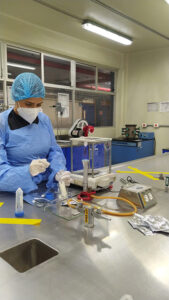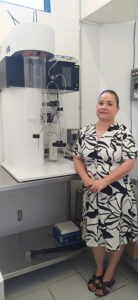 BBy, a healthtech company revolutionizing hospitals’ breast milk storage and administration process, introduces its food device that condenses breast milk to a powder, maintaining the crucial bioactive components that make breast milk the best infant nutrition. BBy is disrupting a 70-year-old process in which hospitals have stored and administered donor breast milk in freezers, wasting hours of professional nursing time defrosting and preparing the milk for feeding in the neonatal intensive care unit (NICU). The company is also announcing $3 million in seed funding.
BBy, a healthtech company revolutionizing hospitals’ breast milk storage and administration process, introduces its food device that condenses breast milk to a powder, maintaining the crucial bioactive components that make breast milk the best infant nutrition. BBy is disrupting a 70-year-old process in which hospitals have stored and administered donor breast milk in freezers, wasting hours of professional nursing time defrosting and preparing the milk for feeding in the neonatal intensive care unit (NICU). The company is also announcing $3 million in seed funding.
Pioneer Fund led the funding round. As a Winter 2022 Y Combinator participant, BBY also received investment from Y Combinator. Other investors include 7G Bioventures, Cathexis Ventures, and others, including more than $500,000 from Y Combinator alumni.
According to BBy, hospitals in the U.S. spend an estimated $12 billion annually on obtaining and managing breast milk, which can cost from $9 to $15 an ounce. According to Dr. Vansh Langer, BBy CEO, the BBy shelf-stable breast milk can save hospitals millions of dollars a month in labor costs. In addition, hospitals can also eliminate the need for multiple freezers to store donor breast milk and repurpose them for other, more pressing needs.
 If breast milk is simply dehydrated to a powder, it is sterilized and loses its critically important bioactive factors, most notably immunological factors which are the only form of immunity infants have in the first six months of life. However, BBy has developed an algorithm and a one-of-a-kind laser that constantly measures the weight and temperature of the product as it goes through a condenser to become a powder, ensuring it always remains within the bioactive retention zone.
If breast milk is simply dehydrated to a powder, it is sterilized and loses its critically important bioactive factors, most notably immunological factors which are the only form of immunity infants have in the first six months of life. However, BBy has developed an algorithm and a one-of-a-kind laser that constantly measures the weight and temperature of the product as it goes through a condenser to become a powder, ensuring it always remains within the bioactive retention zone.
BBy’s condensed breast milk is packaged in individual, tiny aluminum packets and delivered to NICUs in a two-week cycle. Nurses can quickly and easily mix the powder with water and feed the infants, rehydrating only the amount of breast milk necessary, thus also reducing waste. Today, BBy runs its technology at eight regional processing facilities located near its 17 client hospitals.
“For decades hospitals have devoted some of its limited nursing resources to managing and defrosting precious donor breast milk — which is very fragile and requires particular care — so it won’t spoil and get ruined,” said Dr. Langer. “The defrosting process is a tedious and hours-long process; realistically one NICU nurse per day just oversees that work. We are on a mission to provide hospitals with shelf-stabilized and condensed human milk that is easy to store and reconstitute, so nurses can devote their skills to important and critical infant care.”
The FDA concluded the BBy device is a food device and therefore does not require further medical review. BBy has one patent pending.
“This technology is a game changer for hospitals. Clinical data confirms that the nutrition for these infants is every bit as good and as easy to digest as breast milk that has never been condensed,” said Dr. Blanca Aguilar Uscanga, BBy head of science. “Our process proudly keeps breast milk, breast milk. Nothing added and nothing removed.”
How BBy condenses breast milk to a powder
In his intern year in 2015, Dr. Langer was introduced to Dr. Blanca Rosa Aguilar Uscanga, a tenured bioengineering and food science Ph.D. She had written a paper on the challenges of creating powdered breast milk that maintains all the essential bioactive elements that make breast milk the absolute best nutrition for all infants, but especially for the most vulnerable premature and very sick newborns. Intrigued and recognizing the immense need for a time-sensitive solution to the breast milk challenge, he connected with Dr. Uscanga, and devoted his extra time to researching the problem.
He developed a two-factor laser that can work with commercial condensers. The laser constantly takes the weight of the product and adjusts the rate and temperature of the breast milk being sent into the vacuum to ensure the breast milk stays in the bioactive zone using Dr. Uscanga’s algorithm.
At the end of the process, the breast milk is a shelf-stabilized powder, with all the necessary nutrition and immunological properties.
Today, large research hospitals in Massachusetts, Connecticut, and Texas are among the hospitals using the BBy condensed breast milk for their NICUs. This is the process:
- Every two weeks, BBy technicians pick up frozen donated breast milk from the hospital and bring it to the regional facilities.
- At the regional facilities, the frozen milk is carefully defrosted in a water bath and goes through the condensing and packaging process.
- The aluminum packets are delivered back to the NICUs.
Ten gallons of breast milk are processed twice daily at the facilities. The resulting condensed breast milk can safely last for up to six months.
BBy
www.bbyworld.com.







Tell Us What You Think!